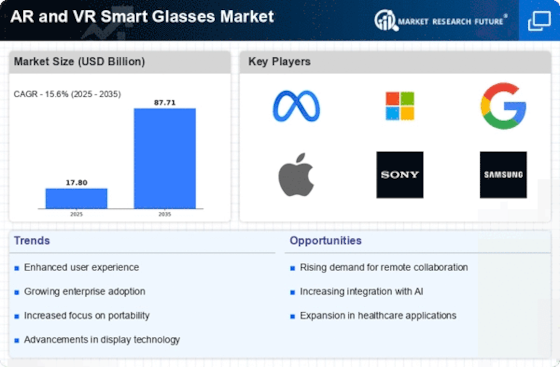Top Industry Leaders in the AR VR Smart Glasses Market

The Competitive Landscape of AR and VR Smart Glasses:
The burgeoning AR and VR smart glasses market is a playground for tech giants and emerging startups. This dynamic landscape is brimming with competition, with players adopting diverse strategies to gain market share and establish dominance.
Key Players:
- Google Inc
- Seiko Epson Corporation
- Samsung Group
- HTC Corporation
- FlexEl, LLC.
- Microsoft Corporation
- Sony Corporation
Strategies Adopted by Key Players:
The battle for market share necessitates strategic maneuvers. Partnerships and collaborations are crucial, as companies form alliances to leverage each other's strengths and reach wider audiences. Google, for instance, partners with Qualcomm on AR glasses hardware, while Meta collaborates with Luxottica on Ray-Ban Stories, blending technology with fashion.
Content creation and software development are equally vital. Building robust app ecosystems and fostering developer communities drives consumer adoption and differentiates devices. Microsoft's HoloLens platform and Meta's Spark AR Studio are prime examples, offering a plethora of applications for various use cases.
Focusing on specific application areas is another key strategy. Companies like Vuzix specialize in industrial solutions, while Rokid targets education, and Nreal focuses on entertainment. This niche-specific approach allows for tailored hardware and software, fostering deeper user engagement.
Factors for Market Share Analysis:
Assessing market share in this nascent field requires looking beyond just sales figures. Technology differentiation, brand reputation, developer support, and content availability all play crucial roles. User reviews, analyst reports, and industry press can also provide valuable insights into market traction and consumer sentiment.
The New Entrants:
The AR and VR smart glasses market is constantly evolving, with new players emerging regularly. Startups like ThirdEye Gen, with its focus on hands-free AR navigation, and Scope AR, specializing in medical applications, showcase the diverse innovation brewing within the ecosystem. These new entrants inject fresh perspectives and keep established players on their toes.
Latest Company Updates:
Samsung Group:
- No official AR/VR smart glasses announcement yet: Samsung has been actively researching and developing AR and VR technologies but hasn't released any commercially available smart glasses yet.
- Focus on XR displays: The company recently unveiled its Micro LED technology, which could be used for high-resolution AR displays in the future.
- Partnerships: Samsung has partnered with Google on AR projects and invested in VR companies like Magic Leap.
HTC Corporation:
- Focus on VR headsets: HTC remains a leading player in the VR headset market with its Vive line of products.
- Vive Flow standalone VR glasses: Released in November 2022, the Vive Flow is a lightweight, portable VR solution focused on entertainment and relaxation.
- Recent developments: No major updates on AR/VR smart glasses specifically from HTC in the past few months.









